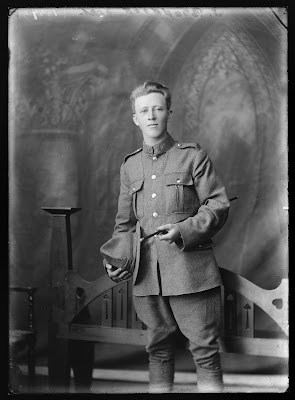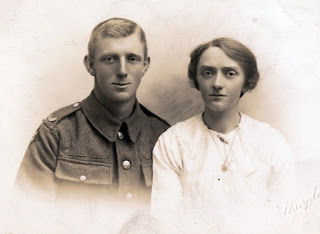 |
| Jack Langley Newby, Wellington NZ 1917 photo by William Berry, Te Papa (B.044362) |
Millions of First World War soldiers posed for studio
portraits of themselves in uniform. Taken before leaving to fight or while on
leave, the photographs were given as keepsakes and comforts to family and loved
ones. They were also poignant reminders of the men who did not return from
battle. Nonconformist minister Edward Shillito published “The Photograph” in
his collection of war poetry Jesus of the
Scars (1919).
The Photograph
Upon the parlour mantelpiece,
In khaki, still without a crease,
The picture of a soldier stands,
With harden’d face and rigid hands;
It keeps for memory the day
In which the old world passed away;
It tells of many battles won
Before the lad put khaki on;
And in his stiff and homely face
Shines all the spirit of his race.
But he will never have to fight
As she who bore him fought that night,
When he came home with khaki on,
And she had lost her only son.
—Edward
Shillito
Photographs of nameless young soldiers from the Great War can
still be found at car boot sales, flea markets and in antique shops. In “The
Green Fields of France,” (you can listen to the song at this link), Eric Bogle
visits the grave of Willie McBride, a man killed in 1916, and asks,
Are you a stranger without even a
name,
Forever enshrined behind some glass pane,
In an old photograph, torn and tattered and stained
And fading to yellow in a brown leather frame?
Forever enshrined behind some glass pane,
In an old photograph, torn and tattered and stained
And fading to yellow in a brown leather frame?
In addition to examining the frozen moment in time when the soldier adopted his stiff pose, Shillito’s poem also dramatizes the conflict experienced by
women on the home front who were asked to support their country’s military aims
while setting aside their own grief and fears. In an earlier poem titled “The
Mother,” Shillito had written,
No plain in Flanders lies more bare
Than this arena of my soul,
For two fierce Loves are struggling there,
And I must pay the toll.
Like ghostly armies to and fro,
Love fights with rival love to-day;
I cannot bear my boy to go,
I would not have him stay.
Mothers were not the only women who bore the strain of balancing
competing loyalties. While serving as a nurse in France during the Great
Retreat of 1918, Vera Brittain received a letter from her father informing her
of her mother’s illness and demanding that she return home: “As your mother and
I can no longer manage without you, it is now your duty to leave France
immediately and return to Kensington.” Brittain recalls her dilemma:
What was I to do? I wondered
desperately. There was my family, confidently demanding my presence, and here
was the offensive, which made every pair of experienced hands worth ten pairs
under normal conditions….Half-frantic with the misery of conflicting
obligations, I envied Edward [Brittain’s brother] his complete powerlessness to
leave the Army whatever happened at home.*
Vera Brittain concludes with an eloquent assessment of the demands
that war places upon women:
 |
| Nellie and Albert, courtesy ww1photos.org |
-----------------------------------------------------
* Vera Brittain, Testament
of Youth, Virago, 2014, pp. 385-386.
** Brittain, Testament
of Youth, p. 386.


No comments:
Post a Comment